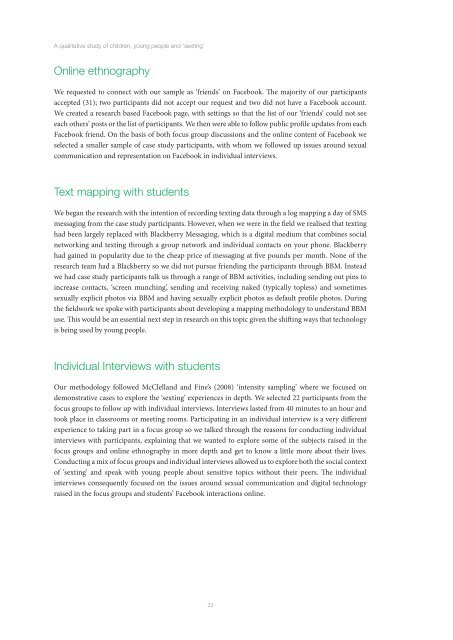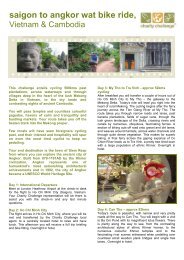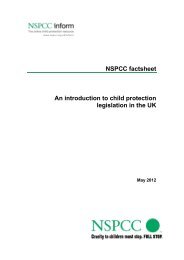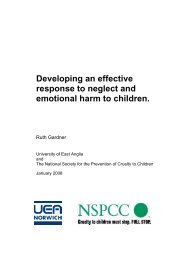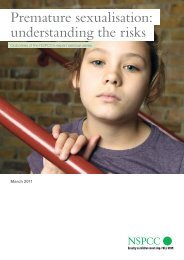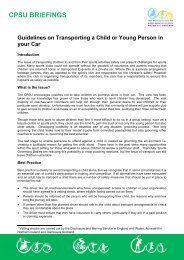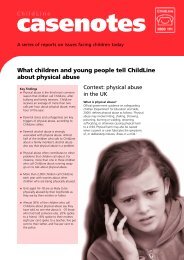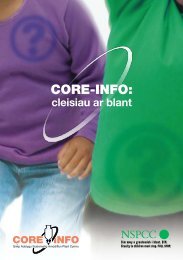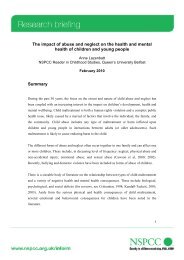A qualitative study of children, young people and 'sexting ... - NSPCC
A qualitative study of children, young people and 'sexting ... - NSPCC
A qualitative study of children, young people and 'sexting ... - NSPCC
Create successful ePaper yourself
Turn your PDF publications into a flip-book with our unique Google optimized e-Paper software.
A <strong>qualitative</strong> <strong>study</strong> <strong>of</strong> <strong>children</strong>, <strong>young</strong> <strong>people</strong> <strong>and</strong> ‘sexting’<br />
online ethnography<br />
We requested to connect with our sample as ‘friends’ on Facebook. The majority <strong>of</strong> our participants<br />
accepted (31); two participants did not accept our request <strong>and</strong> two did not have a Facebook account.<br />
We created a research based Facebook page, with settings so that the list <strong>of</strong> our ‘friends’ could not see<br />
each others’ posts or the list <strong>of</strong> participants. We then were able to follow public pr<strong>of</strong>ile updates from each<br />
Facebook friend. On the basis <strong>of</strong> both focus group discussions <strong>and</strong> the online content <strong>of</strong> Facebook we<br />
selected a smaller sample <strong>of</strong> case <strong>study</strong> participants, with whom we followed up issues around sexual<br />
communication <strong>and</strong> representation on Facebook in individual interviews.<br />
text mapping with students<br />
We began the research with the intention <strong>of</strong> recording texting data through a log mapping a day <strong>of</strong> SMS<br />
messaging from the case <strong>study</strong> participants. However, when we were in the field we realised that texting<br />
had been largely replaced with Blackberry Messaging, which is a digital medium that combines social<br />
networking <strong>and</strong> texting through a group network <strong>and</strong> individual contacts on your phone. Blackberry<br />
had gained in popularity due to the cheap price <strong>of</strong> messaging at five pounds per month. None <strong>of</strong> the<br />
research team had a Blackberry so we did not pursue friending the participants through BBM. Instead<br />
we had case <strong>study</strong> participants talk us through a range <strong>of</strong> BBM activities, including sending out pins to<br />
increase contacts, ‘screen munching’, sending <strong>and</strong> receiving naked (typically topless) <strong>and</strong> sometimes<br />
sexually explicit photos via BBM <strong>and</strong> having sexually explicit photos as default pr<strong>of</strong>ile photos. During<br />
the fieldwork we spoke with participants about developing a mapping methodology to underst<strong>and</strong> BBM<br />
use. This would be an essential next step in research on this topic given the shifting ways that technology<br />
is being used by <strong>young</strong> <strong>people</strong>.<br />
individual interviews with students<br />
Our methodology followed McClell<strong>and</strong> <strong>and</strong> Fine’s (2008) ‘intensity sampling’ where we focused on<br />
demonstrative cases to explore the ‘sexting’ experiences in depth. We selected 22 participants from the<br />
focus groups to follow up with individual interviews. Interviews lasted from 40 minutes to an hour <strong>and</strong><br />
took place in classrooms or meeting rooms. Participating in an individual interview is a very different<br />
experience to taking part in a focus group so we talked through the reasons for conducting individual<br />
interviews with participants, explaining that we wanted to explore some <strong>of</strong> the subjects raised in the<br />
focus groups <strong>and</strong> online ethnography in more depth <strong>and</strong> get to know a little more about their lives.<br />
Conducting a mix <strong>of</strong> focus groups <strong>and</strong> individual interviews allowed us to explore both the social context<br />
<strong>of</strong> ‘sexting’ <strong>and</strong> speak with <strong>young</strong> <strong>people</strong> about sensitive topics without their peers. The individual<br />
interviews consequently focused on the issues around sexual communication <strong>and</strong> digital technology<br />
raised in the focus groups <strong>and</strong> students’ Facebook interactions online.<br />
22


